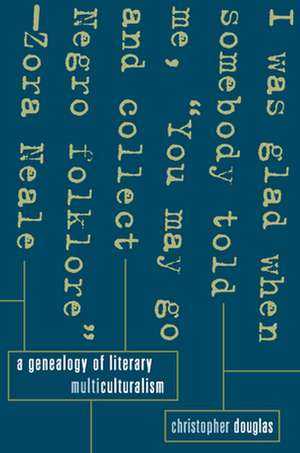A Genealogy of Literary Multiculturalism
Autor Christopher Douglasen Limba Engleză Hardback – 14 mar 2009
In A Genealogy of Literary Multiculturalism, Christopher Douglas uncovers the largely unacknowledged role played by ideas from sociology and anthropology in nourishing the politics and forms of minority writers from diverse backgrounds. Douglas divides the history of multicultural writing in the United States into three periods. The first, which spans the 1920s and 1930s, features minority writers such as Hurston and D'Arcy McNickle, who were indebted to the work of Boas and his attempts to detach culture from race.
The second period, from 1940 to the mid-1960s, was a time of assimilation and integration, as seen in the work of authors such as Richard Wright, Jade Snow Wong, John Okada, and Ralph Ellison, who were influenced by currents in sociological thought. The third period focuses on the writers we associate with contemporary literary multiculturalism, including Toni Morrison, N. Scott Momaday, Frank Chin, Ishmael Reed, and Gloria Anzald a. Douglas shows that these more recent writers advocated a literary nationalism that was based on a modified Boasian anthropology and that laid the pluralist grounds for our current conception of literary multiculturalism.
Ultimately, Douglas's "unified field theory" of multicultural literature brings together divergent African American, Asian American, Mexican American, and Native American literary traditions into one story: of how we moved from thinking about groups as races to thinking about groups as cultures--and then back again.
| Toate formatele și edițiile | Preț | Express |
|---|---|---|
| Paperback (1) | 162.70 lei 3-5 săpt. | |
| MB – Cornell University Press – 14 feb 2011 | 162.70 lei 3-5 săpt. | |
| Hardback (1) | 397.27 lei 3-5 săpt. | |
| MB – Cornell University Press – 14 mar 2009 | 397.27 lei 3-5 săpt. |
Preț: 397.27 lei
Preț vechi: 431.81 lei
-8% Nou
Puncte Express: 596
Preț estimativ în valută:
76.02€ • 79.37$ • 62.91£
76.02€ • 79.37$ • 62.91£
Carte disponibilă
Livrare economică 14-28 martie
Preluare comenzi: 021 569.72.76
Specificații
ISBN-13: 9780801447693
ISBN-10: 0801447690
Pagini: 384
Dimensiuni: 164 x 239 x 32 mm
Greutate: 0.66 kg
Editura: MB – Cornell University Press
ISBN-10: 0801447690
Pagini: 384
Dimensiuni: 164 x 239 x 32 mm
Greutate: 0.66 kg
Editura: MB – Cornell University Press
Notă biografică
Cuprins
Introduction: Multiculturalism's Cultural Revolution1. Zora Neale Hurston, D¿Arcy McNickle, and the Culture of Anthropology2. Richard Wright, Robert Park, and the Literature of Sociology3. Jade Snow Wong, Ralph Ellison, and Desegregation4. John Okada and the Sociology of Internment5. Américo Paredes and the Folklore of the Border6. Toni Morrison, Frank Chin, and Cultural Nationalisms, 1965¿19757. N. Scott Momaday: Blood and Identity8. Ishmael Reed and the Search for Survivals9. Gloria Anzaldúa, Aztlán, and Aztec SurvivalsConclusion: The Multicultural Complex and the Incoherence of Literary MulticulturalismNotes
Bibliography
Index
Descriere
Uncovering the unacknowledged role of sociology and anthropology in nourishing the politics and forms of minority writers in America.
